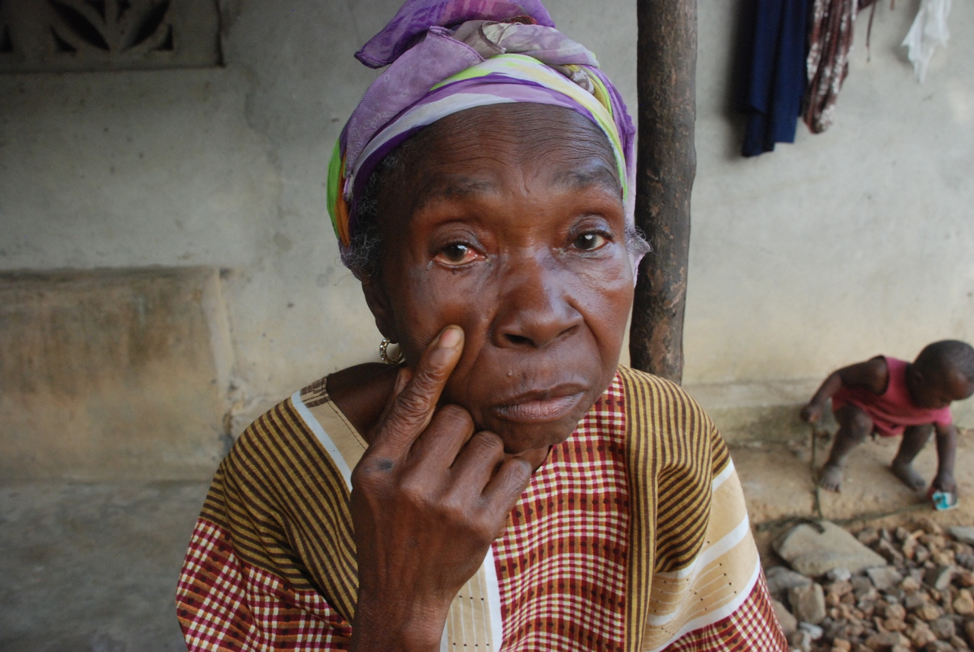Top: An elderly woman said she suffered irritation in her eyes after a car crashed with ammonium nitrate onboard in her village. The DayLight/Varney Kamara
By Varney Kamara
SMALL BOMI, Grand Cape Mount – Barely two weeks after a Bea Mountain truck crashed—spilling ammonium nitrate in a roadside village in Grand Cape Mount—residents of the town are now experiencing different illnesses whose signs are consistent with the inhalation of the dangerous chemical, an investigation by The DayLight has found.
This reporter observed villagers coughing, while others spoke of running stomach, severe headache, chest pain in the chest, eye irritation dried throat, and swollen feet. Some of the sick people we interviewed said they were directly involved in the cleaning of the chemical from the village. Eyewitnesses told The DayLight townsmen who helped clear the area after the chemical spillage, were not issued protective gears.
“I am feeling as if one side of my head is bursting. I am also feeling severe pain in my eyes and in my throat,” Dabah Kawa, a resident of Small Bomi, said through an interpreter. “I can barely sleep at night because of the continued coughing.
“I saw the white dusty smoke with people shouting all around the big car. I ran to my house and realized that the smoke had taken over my entire room,” Kawa said.
Thirty-six villagers have fallen sick, according to Zwannah Zoduah, town chief of Small Bomi. “I was in Monrovia when that thing happened but, I came and joined my people, and we all have started coughing seriously,” he said. The sick include women, children and the elderly, this reporter observed.
Used as an explosive and fertilizer, ammonium nitrate can affect humans. People who come in close contact with the chemical can experience a burning sensation on the skin and in the eyes. Other symptoms include irritation of the nose, throat, and lungs, studies showed. High-level inhalation of the substance can lead to severe headaches, fatigue, and blue color to the skin and lips, and even death.
Villagers in Small Bomi are now showing most of these symptoms, nearly three weeks after they participated in clearing the chemical from their town.
Bea Mountain, which imported the ammonium nitrate, said it will shortly issue a statement on the latest development emanating from Small Bomi. “We have done our own assessment of the situation and management is expected to make a statement soon,” said Henry Vincent, community relations superintendent of Bea Mountain Mining Corporation.

On Saturday, 19 February 2022, a truck carrying the company’s explosives crashed in the Small Bomi village, spilling 26 tons of ammonium nitrate. The truck, marked “TR-007,” was transporting the chemical from Buchanan, Grand Bassa, to the company’s Liberty Goldmine in Kinjor, nearly two kilometers away from the scene of the crash. The consignment was part of 5,000 metric tons of chemical compound shipped to Liberia by KAPEKS, Bea Mountain’s Turkish supplier.
Following the incident, authorities at the EPA, the agency which oversees the transportation of chemical materials had said the spillage was “unlikely to cause any adverse environmental or health risk to the residents of the Small Bomi community.” The agency denied the current condition of the villagers was connected to the spillage of the chemical.
“The agency, therefore, submits that the alleged symptoms presented by the patients…are completely unrelated to the 19th February ammonium nitrate accident,” EPA said in a statement to The DayLight on Friday.
Ammonium nitrate can have both long and short-term effects on people, according to experts. The short-term effect may happen immediately or shortly after exposure. The long-term may last for months or years.
The situation in Small Bomi has claimed the attention of health authorities in the area. Doctors at the Sinje Health Center became concerned after they found no evidence of common cold, typhoid, and malaria—the most common sicknesses they treat in that area—after examining two villagers. It prescribed multivitamins, paracetamol, chloramphenicol, and amoxicillin for two patients, according to the prescriptions seen by us.
“After physical examination of the patients, I found out that their condition is stable,” said Daniel Kofa, Medical Director of the Sinje Health Center, announcing the county health team was to shortly conduct an assessment of the situation.
“Given the history of the patients, we have alerted the county health team on this matter. It is a community matter which has drawn interest,” Kofa said.





Facebook Comments